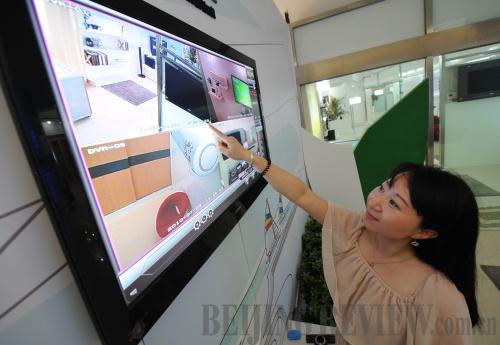|
 |
 |
|
SMARTER GRIDS: Staff members of the Wuxi Power Supply Co. check equipment at the Xijing 220-kv intelligent transformer substation, the first of its kind in China (PAN ZHENGGUANG) |
CONTROL FROM ANYWHERE: A staff member interacts with a screen providing real-time information on a home connected through the Internet of Things at IGRS Center, Beijing (LI WEN) |
According to the China Center for Information Industry Development and the Software and Integrated Circuit Promotion Center of the MIIT, construction of a core network to manage China's own network of smart interconnected devices and sensors is already in the works and is slated to be completed in late 2013.
Smart technologies will be applied to China's transportation, power grid and video monitoring systems and then expanded to other fields.
Shanghai Pudong International Airport is the first airport in China to apply smart technologies. With more than 30,000 sensors, the airport's system can track fences and low-altitude areas to prevent trespassing and terrorist attacks.
The Chinese Government has been expanding financial support on the development of smart technologies, with the Internet of Things as one of China's five emerging strategic industries. In April this year, the Ministry of Finance and the MIIT promulgated the Interim Measures for the Management of Special Funds for the Development of the Internet of Things. The measures make special funds available for the development of smart networks. So far, more than 1,000 companies focused on developing China's smart industry have applied for the special funds.
Market potential
Liu Yuting, Director of the Department of Enterprises of the Ministry of Finance, said the market scale in 2010 for the Internet of Things reached 193 billion yuan ($29.83 billion).
According to Liu, the core technologies for China's Internet of Things, low frequency and high frequency RFID, have reached an effective level of applicability. In 2010 the market scale for these technologies totaled 10.53 billion yuan ($1.63 billion). More than 1,600 companies nationwide are engaged in researching and producing sensors. Moreover, China has the world's biggest and most advanced public telecommunications network.
According to figures released by Iimedia Research, a mobile and Internet consulting company, by 2015, China's market scale for smart technology will total 916 billion yuan ($141.58 billion).
Research by the CCID Consulting Co. Ltd. shows that market prospects for the application of smart technology in households, power and public security, health monitoring, intelligent transportation, environmental protection and other areas will be much better than those of the computer industry.
Bottlenecks
At the 2011 China Summit for the Development of the Internet of Things, Liu Yunjie, a CAE member, said the smart technology industry, despite its broad market prospects, faces major challenges.
Technology in the sector still needs time to develop. High-end chips and sensors will be needed for China to reach its full all-connected potential. There are also no generally accepted international industrial standards when developing these technologies. Coordinating among different international organizations has been difficult, if not impossible.
In applying the massive network of wireless devices and hubs, the market needs to be nurtured and a more effective business model created.
The industrial chain for producing and applying technologies and equipment required to establish an Internet of Things network is complicated and in need of a powerful integrator to break down industrial barriers and share industrial resources.
Also, the industry itself faces threats and challenges concerning national security and personal privacy. Special safeguards will need to be implemented before the Internet of Things can come into full use in China.
Besides these problems, telecom bottlenecks and external environment changes are also obstacles China's Internet of Things industry faces, according to a report of CCID Consulting. As it stands, sensors are only reliable within a range of 100-1,000 meters. The sensors are also sensitive to environmental factors, like temperature and humidity changes. Overcoming these technological barriers is a must, said the CCID report.
Moreover, progress in applying core technologies and testing their effectiveness has been slow. So far, 90 percent of the application projects are being pushed by the government. Few of the projects are independently launched and implemented.
Measures to Support the Internet of Things
- Making breakthroughs in core technologies to accelerate the establishment of a sound technology mechanism for the Internet of Things.
- Promoting the construction of model projects for application of the Internet of Things in public management and public services in order to raise public awareness and stimulate the industry's development.
- Accelerating the formulation of standards of the Internet of Things and intensifying protection of intellectual property rights.
- Building a complete industrial chain, providing talent, capital, policy and service to the industry and establishing industrial clusters with continuous innovation capabilities and complete support channels, with the aim of laying foundation for the application of the Internet of Things in various industries.
- Strengthening research and development of information security for the Internet of Things and improving the reliability and safety of technologies and products.
(Source: Ministry of Industry and Information Technology) | 